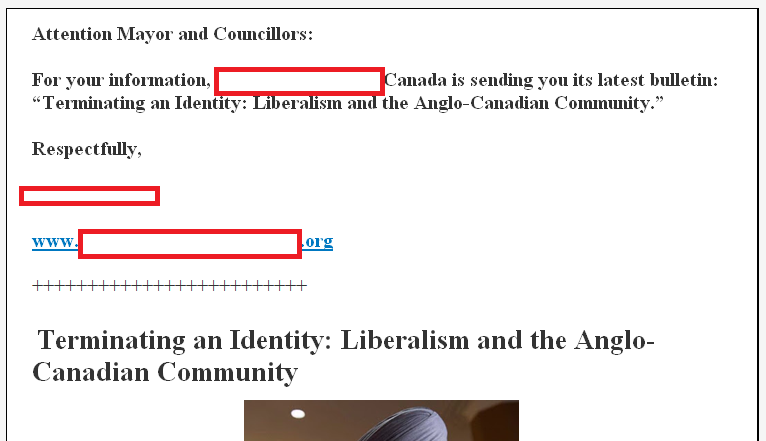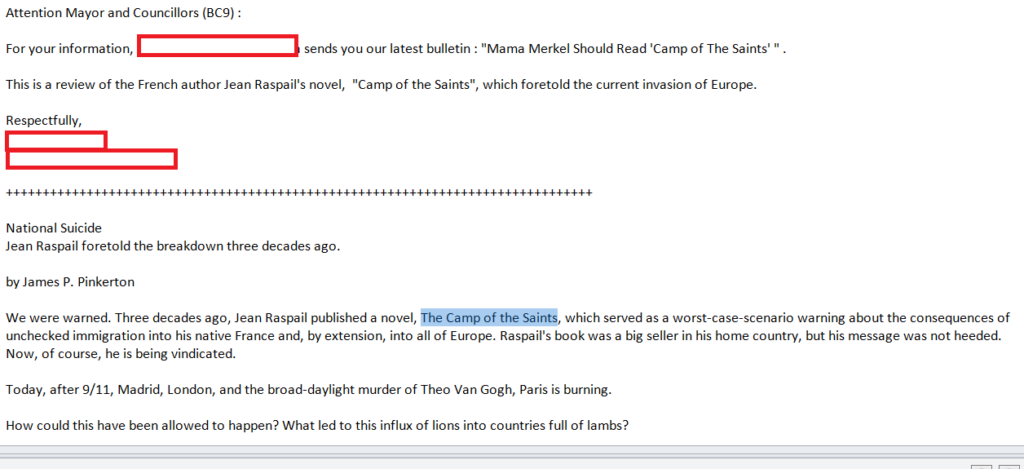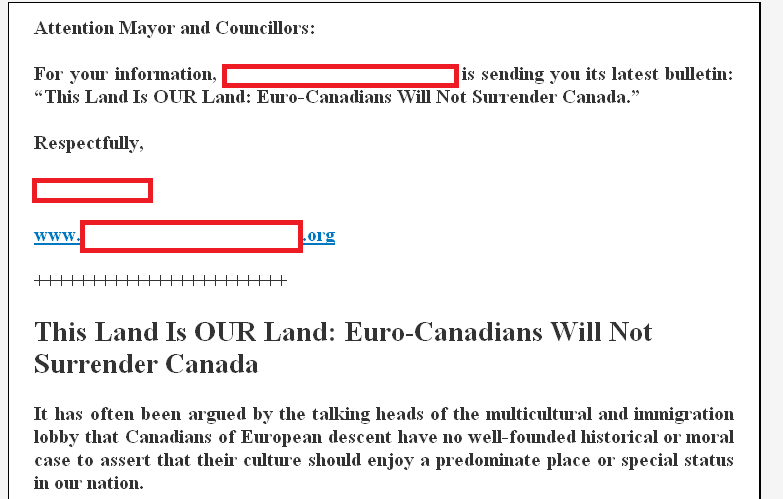Last week in Council, we had an Agenda item entitled “Procedure for Offensive Correspondence Received as part of a Legislated Public Process”. I made mention of it in my Council report, but wanted to put a little more context around it, as it seems topical to events local and around the planet right now.
The background is thus: City Council has some legislated responsibility to “receive” public comment on issues of public interest through Public Hearings, Opportunities to be Heard, and some seldom-exercised quasi-judicial duties we have. To “receive” the correspondence generally means to acknowledge publically that we have received it and had time to review it, and then to enter the correspondence into the Public Record so the public has a right to see what evidence we used to inform our decision about the issue.
This spring, we had application for a temporary use zoning amendment from a community group, and received some correspondence opposing that application that was (in my opinion) offensive. It contained uninformed and hateful comments about people living, working, and worshipping in our community and included links to inflammatory YouTube videos by the most ignorant and intolerant fringes of our society.
During the Public Hearing, when the correspondence was to be received, I asked if it was possible for this correspondence to not be received. Having read it, I did not want it to be entered into the public record, as this would result in the City disseminating hateful speech. I also did not want to leave open an invitation for further bigoted speech to be used in part of our consideration for a land use amendments – at some point you need to say no to racism and bigotry.
At the time, our City Clerk (whose job it is to assure that the procedures followed by Council are legally on the up-and-up) suggested that not receiving a specific piece of correspondence would be irregular, and could potentially result in a legal challenge that may put the application in jeopardy – unintentionally impacting the applicants and empowering the person opposed to them. This seemed a suboptimal result, so I agreed along with Council to receive the correspondence. However, I also asked that we get a legal opinion and strategy to deal with offensive correspondence received as part of a Public Hearing process in the future.
The result, this week, is that staff have outlined a procedure where all correspondence will be received, and delivered to Council, but correspondence considered offensive or inflammatory will not be entered into the Public Record, except in noting that it has been received and redacted. In the end, an interested member of the public could FOI the correspondence that was redacted, but we are not required to disseminate this hate to the general public. I’m pretty happy with this compromise.
Some will call this “censorship”, and to them, I can only link to this XKCD comic, which succinctly outlines what constitutes free speech (excuse the American viewpoint and soft profanity, but the point is made):

Link to the always-excellent XKCD.
This brings to mind the E-mail folder I maintain for my City e-mail, simply labelled “racists”. I get about one e-mail a week that I scan through and send over to this file. They are all apropos of nothing that is happening in New Westminster, as I suspect the small, hateful group sending them is spamming every elected official in BC (or Canada?) with them.



Note, I redacted contact info, and have chosen the headlines of fairly “tame” examples of the 100+ messages I have received. I don’t want to cast light on these groups, but want people to recognize that this ignorant, offensive, bigoted conversation is constantly pressed in the face of elected folks. I keep all of these e-mails as an archive partly because I’m a bit of a digital packrat, but mostly because reading these screeds for the last three years has made me hyperaware of the “dog whistles” used for personal gain by people like Kellie Leitch and Ezra Levant, and Rex Muphy, and (unfortunately) in otherwise polite conversation by otherwise well-meaning people.
The balance between ignoring it and casting light on it in order to oppose it is the challenge of liberal democracy. Mostly, though, I’m disappointed that so many (especially on the right side of the political spectrum) see society as a zero-sum game; If they want more (from the economy, from their government, from life) then there must be some others who deserve less. We can do better.